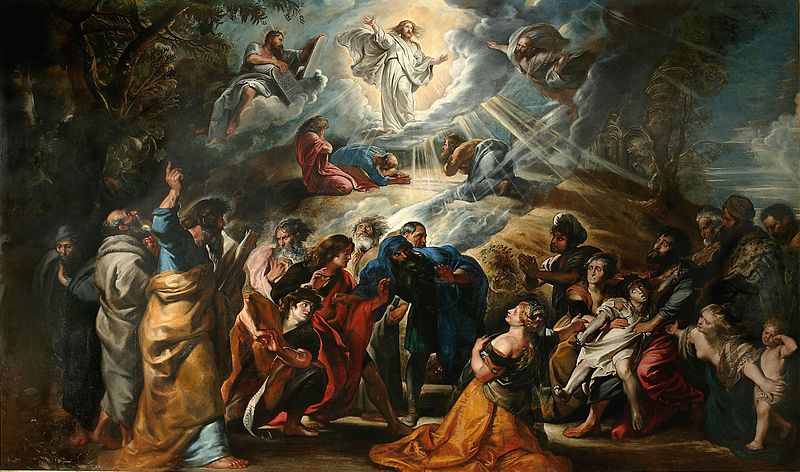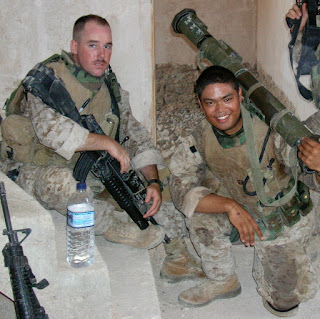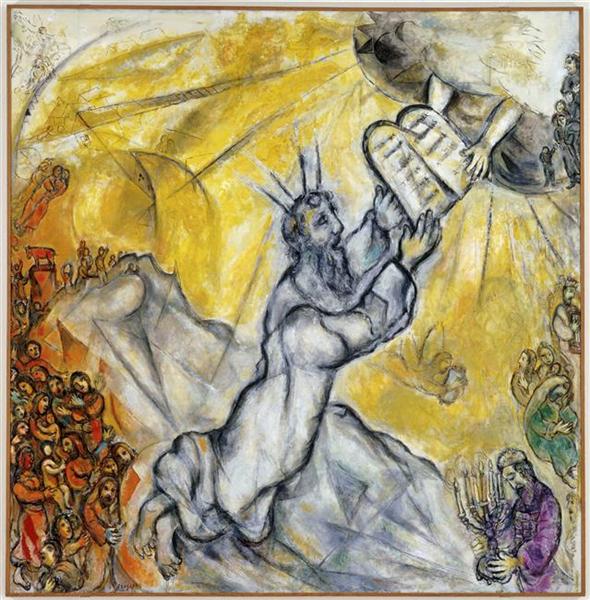Exodus 24:12-18 and Matthew 17:1-9
 |
| Peter Paul Rubens, La Transfiguration 1605 (Public Domain) |
One day in the Appalachian hills of Virginia a hobo was walking along the train tracks waiting for another train to come his way.
As he was walking along, he found himself drawn to the sound of some commotion near the waters of the Shenandoah river.
A bit intoxicated, he decided to investigate a little closer to see if his ears were playing tricks on him.
He stumbled down the steep river bank and found a large congregation gathered at the waters edge, being plunged into the water one by one led by a charismatic itinerant preacher.
Curiously, the drunken hobo found himself mixed in with the crowd and when he accidentally made his way to the front of the line, the preacher asked if he was ready to find Jesus.
“…Okay…. I guess so?” came his reply.
In one swift and violent motion the hobo found himself plunged backwards into the cold water.
As he was brought back to the surface just as violently, gasping desperately for air the preacher asked him;
“Have you found Jesus, my brother?!”
“No, not yet!” replied the confused man.
Frustrated, yet determined the preacher again plunged the man back into the cold waters for a second time, holding him down a few seconds longer before jerking him back to the surface.
“Have you found Jesus NOW, my brother?!!” again questioned the preacher.
Hesitant, confused, and now a bit scared the man replied;
“Uh, I… don’t think I, um… found…”
Then WHAM, the preacher plunged the man backwards a third time into the cold water, holding him there until his legs were kicking out of the water and his arms began to desperately grasp for the preacher’s robe.
When the man emerged for a third time from beneath the cold waters, shaking from fear as much as the cold itself, gasping for air, the preacher asked him once more;
“Did you find Jesus?!”
The now terrified man responded,
“I done my part and looked three times now! Ain’t nobody down there so I suggest you take the next feller a bit further up yonder!”
~
People define what is holy or sacred in many different ways.
People also seem to find God in many different ways, different places, and at different times in their lives.
What is holy to one may not necessarily seem particularly holy to another.
In both the first lesson and the gospel for today, they both seem to point to similar settings as something “holy”.
They both occur on mountaintops.
Mountaintops, places considered sacred throughout scripture but also places that continue to draw many who are seeking a spiritual encounter today as well.
Anyone who has ever had the opportunity to hike or climb to the peak of even the most modest of mountains can attest to the splendor and majesty of a mountain overlook.
Growing up, my favorite overnight backpacking spot was in the Minister Creek Wilderness area, near Warren, Pennsylvania.
There is just something that seems to make us feel as if we are closer to the Divine when we are surrounded by the seclusion and immensity of a panoramic wilderness view.
Perhaps it is being able to capture the scale of our humble stature comparatively to the immensity of such a scene?
It certainly makes us feel quite small, but then again, so should God.
 |
| Jean-Léon Gérôme, Moses on Mount Sinai, 1895-1900 (Public Domain) |
Maybe that is why mountaintops and high places were considered holy places by all the cultures of the ancient near east, especially the area of Palestine and Israel.
And when Moses is called to the mountaintop, each time, it is considered to be a holy place, sacred ground.
Not just because it is a mountaintop but because God is physically present there with Moses.
And while this is not the first private court Moses attends as God’s guest, there is a special reason for this invitation.
Moses is given the plans for constructing the tabernacle and the ark of the covenant.
The tabernacle which is a sacred tent that will serve as the holiest place of all for the Israelites until the Temple is built by Solomon much later.
It is a sacred place they will carry with them throughout their wilderness journey.
Carrying it as they march on to the land they have been promised, setting up the tent, the tabernacle, along the way so that God may be present with the people as they go along their way.
Breaking down the tent and putting it up again, as they move from place to place.
A tedious chore that must be completed in a specific and precise way.
Moses is also given the blueprint for the ark of the covenant, another sacred object that is sometimes better known for its role in the story of Indiana Jones, than the one we hear today.
It serves as God’s throne or seat.
A royal throne for God to not only sit, but like the tabernacle, it will serve as the means by which God will be with and among the people.
And so, we find Moses climbing to the top of the mountain, not only seeking God but being given the means to bring God to the people.
A people who have disobeyed God already.
A people who do not even have respect for the leader who served as their liberator from slavery; Moses.
I can’t imagine Moses considered this to be a good plan.
After all, serving as the medium between God and the Israelites had allowed Moses to negotiate for the people when they fell in God’s disfavor.
But God living among the Israelites must have seemed like inviting your parents to live in the barracks or a frat house!
If we consider it from this angle, perhaps we wouldn’t ask why he remained on that mountaintop for 40 days.
The question we should ask is why did he ever come down?
Knowing that these were a people unworthy of God’s presence.
Unable to truly grasp what Moses experienced on that mountain.
Unable to grasp what it meant to be in the presence of what is truly sacred, truly holy.
~
Our Gospel for today presents a similar challenge from a very different perspective.
Jesus has just foretold his humiliation, crucifixion, and death.
He has also foretold the suffering of his own disciples.
Following this prophecy, six days later, he leads them up a mountain.
He leads them to bear witness to something holy, sacred ground on yet another mountaintop.
And it is there that Jesus reveals to three of his disciples, James, John, and Peter, just what and who is about to be humiliated, crucified, and killed.
But I am not so sure that is what is on Peter’s mind at the transfiguration.
Because this word, transfiguration, describes a completely altered physical state, one that undeniably shows Peter, James, and John that Jesus is unmistakably divine.
The words of Jesus that they have just heard, days ago, foretelling of his death must have certainly been cancelled out at this point.
For Peter, James, and John, this holy moment, this sacred ground changes EVERYTHING.
Because for them, this is the promise and the hope they have longed for, since the time of their ancestor's slavery, their ancestor's exile, the occupation of their lands, and the oppression of their people.
It is in this moment that they believe they have fully experienced the holiest ground, the most sacred point in not only their own lives but in the lives of all people.
So why wouldn’t Peter want to build three tabernacles?
One for Elijah, the greatest of all prophets,
Another for Moses, the bearer of God’s law,
And one for Jesus, who Peter can now confirm without a doubt is THE Messiah.
 |
| Duccio, Transfiguration 1308-1311 (Public Domain) |
Because, this is the way the world wants to see it all go down.
Today, we still want a God that rules over us, controlling our destiny, dictating our fates from a high holy throne on some mountaintop.
Probably the very way Moses would have preferred to have it.
We want our own sacred moments, holy mountain top experiences, to be the pinnacle of our faith life.
We want others to recognize our holy mountain top experiences as some divine endorsement of our own special faith that exceeds the faith of others who don’t see things the way we see it.
We want a faith that can be dictated to us, rather than a faith that calls us to participate in not only the life but the death of Jesus Christ.
And so, I cannot imagine Peter’s disappointment as he is trudging back down that mountain knowing that what was foretold has not changed at all.
Just like we, too, find ourselves disappointed when we declare particular moments in our own lives' pinnacle holy moments.
Because when we plant our faith in one moment on the top of a mountain, our faith becomes unchallenged and stagnant.
A faith based in mere feeling, unchallenged by the valleys of our sorrow, untested by the cliffs of our pain.
That is the very reason that the transfiguration of our Lord is the Sunday that closes out the revelation of our Lord through Epiphany, and nudges us onward as be begin our journey through Lent to the cross.
Because it is not just on the mountaintops we are called to find God, not just in our high moments, but in the low ones as well.
~
Twelve years ago, my best friend led me up onto a rooftop.
Not quite a mountain, but it felt like we had just climbed one together.
After spending months patrolling together, we had grown closer than two brothers could be.
We had been brought back to our small forward operating base after our relief had taken our place so that we could rotate back to the states.
After spending many months in sparse and unsanitary conditions, experiencing sickness, fear, violence, and uncertainty, we sat on that rooftop, overlooking a city we had invaded.
A city that we weren’t sure we would even survive, much less both of us.
And as we sat there, my best friend, my brother, said to me,
“No matter what happens in life, nothing will ever stack up to this. You will always be able to look back at this moment, looking out over that city and know that you survived that. Nothing will ever compare to this moment, right now. Now, all we have to do is take one more ride on these roads and we are home.”
I didn’t just believe in what he said, he was using the very words I was thinking in my own head.
It was our mountaintop experience.
And there have been days when I’ve wanted to be sitting on that roof with him, knowing that we had survived, knowing that we had another chance to make something great out of ourselves because we’d somehow made it.
But if we’d have always tried to get back to that rooftop, we’d have never taken the chance to become husbands and fathers.
And if we’d both lived our lives on that rooftop, we could have never shared the joy that we share together in our lives and calls today.
To top it all off if we’d have kept trying to get back to that rooftop, I’d have never met my brother’s child for the first time this weekend.
 |
| In New Valleys and Mountaintops, but still brothers today. |
And all these valleys, hills, and yes other mountains do stack up to that moment on that roof.
~
Sisters and brothers, we cannot place our faith, our hopes, or our expectations in a single solitary moment on a roof or a mountain.
If we do that faith remains a stagnant dead thing and our faith is not something meant to be caged in a single nostalgic moment.
It is a living thing meant to thrive in the valleys that will sometimes lead to the crosses we will have to bear.
Because God is among us and God seeks us out in many more places than just the mountaintop moments.
And as we come down off the mountain today, let us prepare ourselves for the road that will lead us to that cross+ where we will find God, among us.
Amen
 |
| Andrea di Bartolo, Christ on the Road to Calvary 14-15-1420 (Public Domain) Sources
Kasdan, Lawrence, George Lucas, and Phillip Kaufman. Raiders of the Lost Ark. Directed by Steven Speilberg. Hollywood, California: Paramount Pictures, 1981. Film.
|





